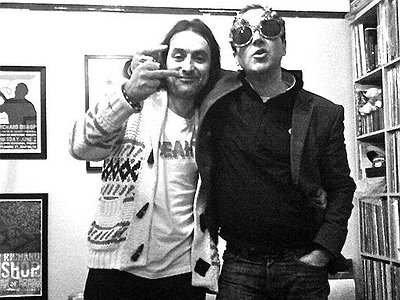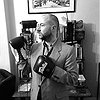Music journalism has frequently been attacked for merely expressing opinion. On the other hand, it is precisely personal interest in an artist and/or his work which frequently provides for a stimulus to delve into them in more depth. How would you describe the importance of subjectivity for your writing?
All of my favourite writing is intensely subjective, how is it possible to be any other way? I don’t believe in objective standards but at the same time you do have to have a strong feeling that your tastes are somehow ‘right’ in order to make convincing arguments. It’s a total contradiction I know, in that there are no objective standards yet I believe my taste to be objectively correct, ha ha...
You play your part with gusto, is what I’m trying to say. While knowing deep down that there is no particular truth to it, you do it for the fun of being yourself, for the joy in the endless winging, which is how Aleister Crowley describes it. In the Bhagavad Gita, Arjuna at first refuses to join the battle because he realises he is fighting against husbands and fathers and his own kinfolk basically, but then he has a moment of epiphany where Lord Krishna appears on the battlefield and lectures him on personal dharma and weakness of heart and implores him to get back up and join the fight regardless. "As brothers fight ye" is another great quote from Crowley about the same thing. In other words, get stuck in and play your part but realise that the stakes are really not that high and that in the end everything is forgiven. But still, play it as if it was for keeps, because she’s the only game in town and she loves a player. Strength of devotion is all. Love, basically.
For me the best writing, like the best music or art, is highly idiosyncratic, non-systematic and absolutely devoted. My favourite writers are people like Malcolm Lowry and Blaise Cendrars, wild, obsessive writers. Cendrars is a particular inspiration, not just in his amazing prose but in his lust for life and his all-devouring energy that manifested itself in so many ways. The Astonished Man is the name of one of his books. I would like to think that could be my epitaph and that I could live up to it, somehow, in the end.
In which way does writing and reading about music change the way it is perceived by the public?
At its best it can make you listen in new ways, hear new things, upturn your assumptions and open your ears.
Whom do you feel your obligation to – the artists, the readers, the publication you're writing for? In how much do you feel is music journalism restricted by external factors?
No obligation to the artist at all beyond taking what they do seriously. If you suffered from any obligation beyond that, I think you would be completely paralysed in terms of expressing an opinion. I feel a certain responsibility towards the reader, in that I feel you should convey some kind of useable information to him/her/it. Responsibility to the magazine? Sure. You’re representing them and you want to do your best, especially in a place like The Wire, where the standing of writing is high, overall. But I really don’t feel restricted by external factors at all. As I have said, The Wire has been a true place of freedom for me where I get to write about what I like, how I like. I am aware that is a very privileged position, especially in this day and age, and that it’s increasingly a rarity, to have that much freedom and get paid for it.
Journalism and writing have changed considerably over the past century. What, do you feel, could – or should - be new forms and formats for music journalism?
I would like to read music writing that was closer to the experience of listening to music, synaesthetic writing, sensual writing, writing as music as art as literature. Most music writers do not have the vocabulary to deal with sound-as-sound and so they fall back on social criticism or zeitgeisty themes, that’s why they prefer to write about music that intersects with the mainstream or the culture at large, it’s easier for them to write about non-musical concerns. I’d like to read music writing that doesn’t betray the music itself.
Music-sharing sites and -blogs as well as a flood of releases in general are presenting both listeners and artists with challenging questions. What's your view on the value of music today?
I think music has been de-valued to a certain extent. It has lost some of its aura and some of its mystery. The whole process of tracking records down, these talismanic objects secreted in various off-the-map locations, and the process of piecing together discographies, it was all a kind of initiation in a way. It’s too easy now and some of the fun has gone from it because of that, as well as a lessening of respect for artists and writers and creators.
I hate the way that on the Internet, art can be stolen and yet the thieves retain the moral high ground. When I see people like Kenneth Goldsmith of UbuWeb tweet things like, if you put your work on-line you should expect to have it stolen, darling, it sounds to me like rape logic, you know, like if you put it out there, darling, you are in effect asking for it. But people like Goldsmith have a vested interest in convincing other non-creative types, that lack of talent is in fact a talent. It helps them feel better about themselves. Uncreative Art as an ideology is kind of like the Samaritans for art school losers. And of course it relies on having someone else create original art in the first place.
I’m not a very online-focused person. I have little interest in the internet. E-mail is a chore. I have attempted various blogs and online things over the years but I always lose interest and resent the time and attention they demand and end up abandoning them or shutting them down. I like books and long walks and records and food and drink and conversation and human beings sitting right in front of me looking fine.
Please recommend two magazines or journalists to our readers which you feel deserve their attention.
The Wire is still the best music magazine out there. I still get a kick when I see it on the shelves of some high-street store, it’s the last bastion. I am a voracious reader and hoarder of magazines, journals, fanzines and small press publications, a random selection of some that have been important or formative over the years would include Black To Comm, Abraxas, The Malcolm Lowry Review, Tree, Faunus: The Journal Of The Friends Of Arthur Machen, Doctor Who Magazine, Reforesting Scotland, Mimeo Mimeo, Forced Exposure, Mayfair, Wormwood, Strange Attractors Journal, Personal Best, Men Only, The Comics Journal, Logopandocy, Io, Coyote’s Journal, 2000AD, Root Branch & Mammal, Leg Sex, The Equinox, Creem, The Cimaron Weekend, Arken Sword.
Please recommend two artists to our readers which you feel deserve their attention.
I’ve talked a lot about music so I’d like to recommend two of my favourite visual artists. I’m hugely fascinated and attracted to mannequins and dolls and the secret children created by Morton Bartlett are amongst the most beautiful creations, not to say the most precious and heart-breaking examples of do-it-yourself art, longing and desire, that I have ever encountered. I also remain completely under the spell of the photographs of Bernard Faucon, specifically his Summer Camp series from the 1970s, who another one of my favourite artists, Giselle Vienne, introduced me to. When I die I hope to be reincarnated inside one of his photographs. I suspect that’s where heaven is, if it’s locatable anywhere.





